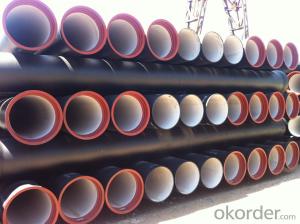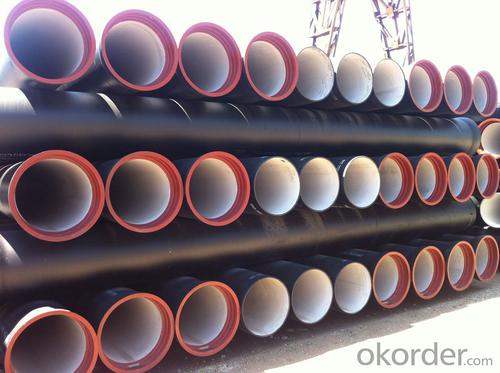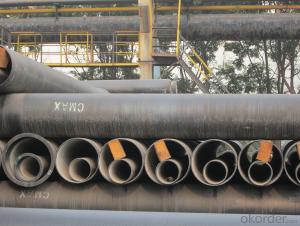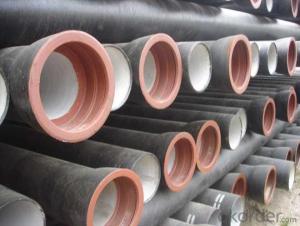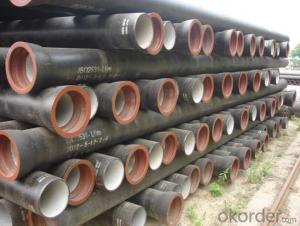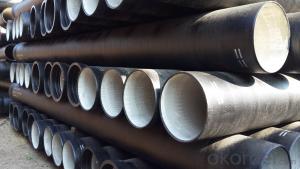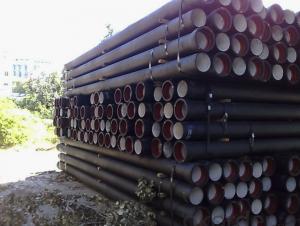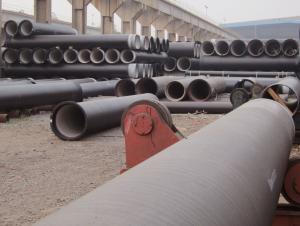Ductile Iron Pipe of China DN150-DN1000 EN545/EN598/ISO2531 High Quality
- Loading Port:
- China main port
- Payment Terms:
- TT or LC
- Min Order Qty:
- 25 m.t.
- Supply Capability:
- 300000 m.t./month
OKorder Service Pledge
OKorder Financial Service
You Might Also Like
1,Ductile Iron Pipe Description :
1) Pipes confirm to ISO2531,K9 class,T type joint,6m long,with inside cements lining conform to ISO4179, outside Zinc spraying(130g/m2) and bitumen coating(70μm) conform to ISO8179.
2) Pipe ends: Spigot and socket ends, with 100% SBR rubber gaskets accoding to ISO4633
3) we can do third party inspection according to customer's request.
2,Main Features of the Ductile Iron Pipe:
·High yield strength
·High tensile Strength
·High corrosion resistance
·Pressure Resistence
·Anti-corrosion
3,Ductile Iron Pipe Images:
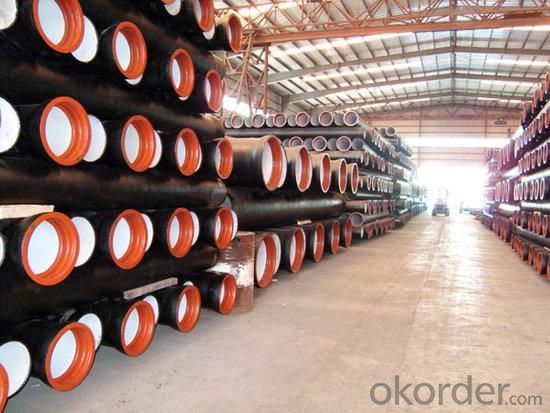
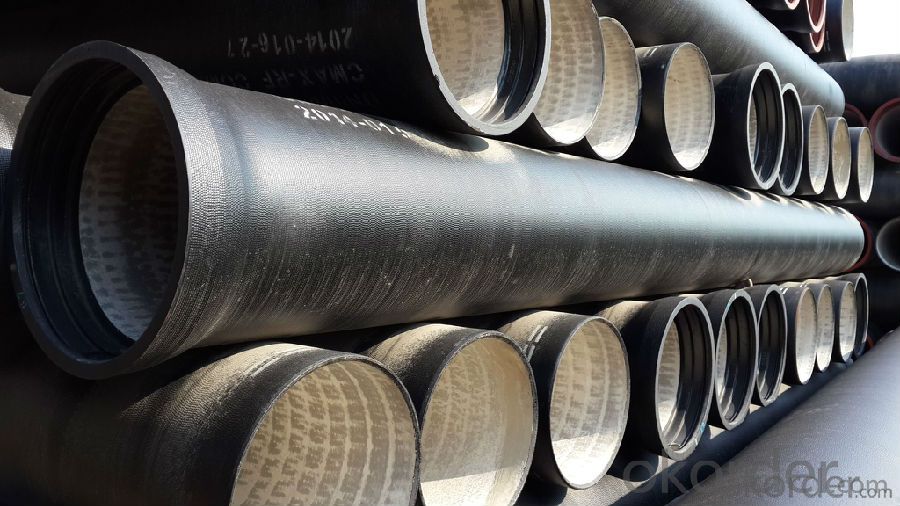
4. Ductile Iron Pipe Specification
Surface Finishes:Bare, Oiled, Mill Varnish, Galv,FBE, FBE Dual, 3LPE, 3LPP, Coal Tar,Concrete Coating and Tape Wrap
End Finishes: Beveled, Square Cut, Threaded, hat
Additional Services: Internal Coating
Packaging: packed in bag, plastic bag, steel strip, steel wire,double wire, iron box, wooden box,
Test :X-ray, UT, magnetic particle,inspection,hydrostatic test.
Processing service :Beveling, Threading, Slotting, Cut-to length, Bends, Quench and Temper, Fabrication, Double-jointing and On-site assistance
Documentary MTC: material certification,Origin certification, CI or PI,Test Report, export licence, handling order, B/L,insurance policy,shipping instructions, contract, packing list etc.
5.FAQ:
We have organized several common questions for our clients,may help you sincerely:
1.Q: Why would you choose ductile iron pipe rather than other pipe materials?
A:The reasons are obvious for that not only ductile iron pipe possesses the inherent strength and flexibility of ductile iron, combined with proven corrosion protection systems, but also the cost savings can be achieved from design to installation and commissioning.
2.Q:Why can you guarantee the inner of pipes can’t be corroded?
A: High alumina cement mortar lining and sulphate-resistant cement mortar lining. These two special linings are applicable to inner anti-corrosion for sewage pipes, improving resistance to erosion of the sewage components.
- Q: What is the maximum pressure rating for ductile iron pipe?
- The maximum pressure rating for ductile iron pipe typically depends on several factors such as the pipe diameter, wall thickness, and the type of joint used. Generally, ductile iron pipe is manufactured to withstand a maximum pressure rating of up to 350 psi (pounds per square inch) or higher. However, it is important to consult the specific manufacturer's specifications and guidelines to determine the exact maximum pressure rating for a particular ductile iron pipe.
- Q: Can ductile iron pipes be used for railway bridges?
- Indeed, railway bridges can utilize ductile iron pipes. Ductile iron, a resilient and sturdy form of cast iron, possesses remarkable tensile strength and flexibility. These characteristics render it suitable for a wide array of uses, railway bridges included. Ductile iron pipes serve as ideal building materials for various railway bridge elements, such as supports, beams, and columns, providing not only structural stability but also the ability to endure substantial loads and vibrations associated with railway traffic. Moreover, ductile iron pipes exhibit resistance to corrosion, a vital attribute for railway bridges that face exposure to outdoor conditions. Consequently, ductile iron pipes represent a viable and effective choice for constructing railway bridges.
- Q: Are ductile iron pipes resistant to biogenic sulfide corrosion?
- Yes, ductile iron pipes are resistant to biogenic sulfide corrosion. The high strength and durability of ductile iron make it highly resistant to the corrosive effects of biogenic sulfide, making it an ideal choice for underground sewer and wastewater applications.
- Q: Are ductile iron pipes resistant to microbiologically induced corrosion?
- Yes, ductile iron pipes are highly resistant to microbiologically induced corrosion. The unique composition and structure of ductile iron make it less susceptible to the growth of microorganisms and the subsequent corrosion caused by them. Additionally, the protective oxide layer that forms naturally on the surface of ductile iron pipes provides an extra layer of defense against microbiological corrosion.
- Q: Method for cutting cast iron pipe
- Depends on the material and the use of requirements. Ordinary gray iron, if the incision is not strict, such as water pipes. They are all sheared with hydraulic cutting machine, but the incision will not be very smooth. If it is ductile iron, and the incision requirements are high, it can only be used plasma cutting machine. General fittings, if not specifically required, shall not be cut by machining methods.
- Q: What is the excavation width of ductile iron pipes with diameters greater than 1400?
- When the condition does not allow enough slope, it is necessary to do wall protection and other means to ensure safetyRemind me, such a big pipe, dig deep in two ways. One is the depth diameter (range at the junction of 1.6 m in length and 500 for manholes and operation. The lower bolt assembly when) there is a depth diameter plus 500. and then in the trench laying branch the pier, installed after the fine stone tamped backfill.Can also be buried directly with the pipe diameter, and then put into the assembly. This method requires a large space on the ground, otherwise, the volume is too large after assembly, weight is too heavy, may cause damage to the pipeline and personnel injuries
- Q: Can ductile iron pipes be used for underground storage tanks?
- No, ductile iron pipes are not suitable for underground storage tanks. Underground storage tanks usually require special materials that have corrosion resistance and can withstand the pressure and environmental conditions.
- Q: Can ductile iron pipes be used for potable water systems?
- Indeed, potable water systems can utilize ductile iron pipes. Ductile iron, which undergoes treatment with magnesium to enhance its strength and flexibility, characterizes this type of iron. These pipes are esteemed for their robustness, resistance to corrosion, and ability to endure high pressure. They are frequently employed in water distribution systems, inclusive of potable water supply. Nevertheless, guaranteeing that the ductile iron pipes employed in potable water systems adhere to the requisite standards and regulations set by local authorities, such as NSF/ANSI 61 for drinking water system components, is of utmost importance. Consistent maintenance and regular testing are also indispensable to ensure the ongoing safety and excellence of the potable water system.
- Q: Do ductile iron pipes require internal linings or coatings?
- Yes, ductile iron pipes typically require internal linings or coatings in order to prevent corrosion and extend their lifespan.
- Q: Can ductile iron pipes be used in coastal or marine environments?
- Ductile iron pipes are applicable for coastal or marine environments. This type of cast iron has been treated with magnesium to enhance its strength, ductility, and resistance to corrosion. As a result, it can be used in environments with high moisture levels, like coastal or marine areas. Coastal and marine environments are characterized by their high saltwater levels, which can lead to metal pipe corrosion. However, ductile iron pipes possess an excellent resistance to corrosion thanks to their protective coating. This coating acts as a barrier between the pipe and the corrosive elements present in saltwater, preventing rust formation and prolonging the pipes' lifespan. Moreover, ductile iron pipes can withstand the high pressures and stresses associated with coastal and marine applications. They possess high tensile strength, enabling them to support the weight of soil, rocks, and other materials that may be present in these environments. Furthermore, ductile iron pipes are resilient to damage caused by external forces like waves or debris, making them a dependable choice for coastal or marine projects. In conclusion, ductile iron pipes are a suitable option for coastal or marine environments due to their corrosion resistance, high tensile strength, and durability. They can reliably transport water or other fluids in these challenging environments while maintaining their structural integrity for an extended period.
Send your message to us
Ductile Iron Pipe of China DN150-DN1000 EN545/EN598/ISO2531 High Quality
- Loading Port:
- China main port
- Payment Terms:
- TT or LC
- Min Order Qty:
- 25 m.t.
- Supply Capability:
- 300000 m.t./month
OKorder Service Pledge
OKorder Financial Service
Similar products
Hot products
Hot Searches
Related keywords
